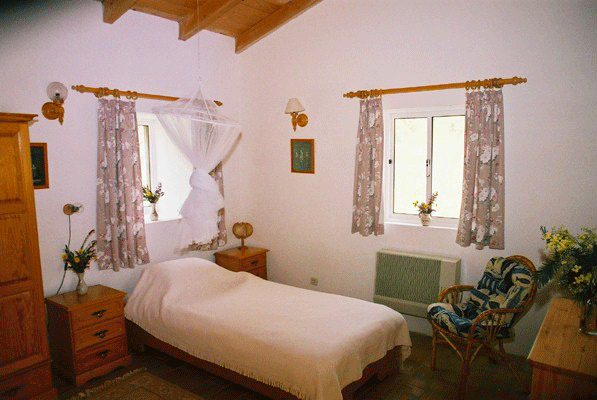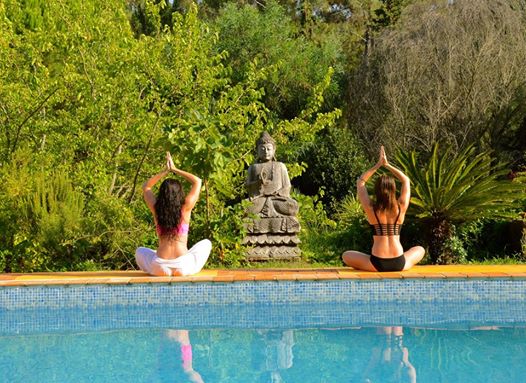Flushed With Success
Lisa McGarry discovers how to get modern living out of her system at a health farm on the Algarve
Saturday October 20, 2001
The Guardian
I was giving up fags and wanted to shed a few kilos prior to obligatory post-nicotine weight gain, but a two-week juice fast at Moinhos Velhos, anorganic farm in Portugal, resulted in food for thought regarding my cynical, hedonistic city lifestyle. There are no short-cuts to health and happiness, but a complete gastrointestinal purification program detoxifies and rejuvenates the most sluggish system, enabling either a life of post-fast purity, or outrageous amounts of fun re-toxing.

The program was devised by Anne-Karine Moss and Frank Jensen, Norwegian holistic health practitioners who established their retreat eight years ago, for the purification of body, mind and spirit, in a beautiful valley deep in the Algarve countryside, and who are indecently fit for their ages, respectively 65 and 71.
The care that has gone into fine-tuning every aspect of the fast and its environment is the key to its success: from the glass-walled yoga temple, the wind-chimes swaying gently on the trees, the various Shivas and Buddhas dotted around the undergrowth, to the staff who dedicate endless time and energy to each group, and the sauna, saltwater swimming pool and the acres of land. It is clear that if one must be deprived of food in order to emerge, chrysalis-like, from a layer of toxins and blubber, this is clearly the place to do it. The we will, we will, cleanse you! vibe was something of a shock to someone from the grimy bowels of sarf London, carrying a thumping hangover along with her luggage. I was suddenly in a place which credited devas and nature spirits with equal rights, and which necessitated an extended, though not entirely unwelcome, reality check.
A typical day goes like this:
6.45am: Chandra and his silver bell provide a gentle wake-up call.
7.15am: Up to the house for lemon tea, and a spot of meditation.
7.45am-9.15am: Yoga (once weekly chi gong).
10am: A litre of orange juice is taken with mineral and herb supplements to flush out the toxins, stimulate the breakdown of undigested matter, and generally assist the cleansing process.
11am: Individual therapy sessions, comprising kinesiology (muscle testing to reveal energy blockages), acupuncture, bio resonance therapy (to restore energy balance, cure allergies, and treat scar tissue), ACTS (a computerized system to rid the body of negative cellular memories/energies, and zapping (to eliminate internal parasites). Massage is an optional and irresistible extra, from McTimoney, to realign the spine, to Thai, for relaxation.
11.30am: Clysmatic (self-administered colonic irrigation).
1pm: Lunch, usually melon, apple or cucumber juice, followed by more afternoon treatments (usually one or two per person per day).
4pm: Vegetable juice (generally carrot with beetroot as side dish).
5.30pm: Another clysmatic. (Sauna sessions run in the late afternoon, also.)

7pm: The evening meal is broth: vegetables cooked in water, and strained before the addition of miso paste. For added spice, piri-piri and olive oil can be added. While it felt strange for the first few days to be so full of liquid yet empty of food, there was none of that bloated, energy-sapped feeling you get digesting large amounts of solids. However, the knowledge that everything entering my body was for once virtuous was a tad mind-blowing. 7.45pm: Meditation. The rest of the evening is free to walk the dogs, watch a vid, read, satellite-gaze, or go crazy on ginger tea. Although I was initially dubious about such sustained sobriety, the exercise, sun, clean air and early starts meant that I was out for the count by 11 most nights. The beauty of the holistic approach is that while many retreats may administer similar treatments in a bid to purify the body, few concentrate so equally on the mind and the emotions, which are often the root of the body's problems. What I found most surprising was the emotional side of the detox: feelings that I would normally subsume by lighting up or glugging down some alcohol came to the fore. To my horror, I found tears rolling down my cheeks during difficult yoga moves or when my fellow fasters got on my nerves. But afterwards I felt release, and the highs that followed made up for the more difficult moments. The rest of the group were there for various reasons: one woman wanted relief from the ME she had suffered for several years, which rendered her unable to digest solid food; another sought help for her recuperation from a back operation. The only man in our group wanted to reduce his considerable frame after 20 years of excessive falafel consumption in the Middle East. After years of basing my fitness regime around dancing and stairs machines, I could almost hear my muscles shouting "Yeeessss!" as I stretched them to their limits during yoga. While the pain of extending my hamstrings meant I was rendered tearful during forward bends (blame the high heels, apparently), the excitement of being able to touch my toes for the first time in 18 years - (the last successful attempt was when I was eight) was such a buzz that I almost took a lap of honour. The small groups and unhurried teaching offer a level of attention all too absent in big yoga centres, which means that even the roundest, wheeziest specimens were soon performing shoulder stands and balancing on one leg with aplomb.

I'm not the kind of girl who welcomes inanimate anal intrusion, so for me the twice-daily clysmatic was the most feared aspect of the fast. For those who have never experienced colonic irrigation, the clysmatic is used to remove the buildup of hardened deposits in the intestinal wall with the aid of around five litres of water. It was an unsavoury process, and the sensations produced were novel to say the least, yet the twice-daily evacuation triggered a feeling of lightness within. It's rather liberating, but I was disappointed that I failed to pass the black deposits which are the oldest and most toxic. Wednesday is free day, which means a trip to nearby Lagos, the beach, or anywhere that gains the majority vote (no, not the pub). While it's a nice change to leave the farm and check out normality, I found the sight of portly tourists stuffing themselves with inordinately large plates of calamari nausea-inducing, and even my big weakness, ice-cream, didn't appeal. The local beaches are beautiful, however, and the days out offer the opportunity to see the world outside Moinhos Velhos. We felt like a travelling freak show, the Amazing Non-Eaters, but as an exercise in self-control, the outings proved that temptation is easily overcome.
The fast spans 10 days, after which food is gradually re-introduced: first fruit, then salad (I never thought that I would drool over lettuce), then a full meal on the final night (complete with wine - after the abstinence from alcohol I instantly felt rather tipsy!) It was strange, however, that having looked forward to it for so long, food was less intense in flavour than juice, and mastication seemed a lot of hassle, particularly as we were urged to chew each mouthful 36 times. The simplicity and innate freshness of juice makes readjustment to food, no matter how salivated over, a curious process. And while some of our number returned to eating like over-enthusiastic cows to cud, others didn't feel ready and stayed on the juice for a few more days.
Fasting might sound an extreme step to take, but to my surprise it was only on the rare occasions that I felt genuinely hungry. Indeed, only towards the end did I start to crave solids.
I left Moinhos Velhos slimmer, fitter and healthier. My eyes were clear, my tongue pink as a newborn pup's, and I felt as if the over-indulgence and stress of the past decade had been effectively removed. While re-integration meant balancing my new knowledge with my old lifestyle, sushi, Thai food accompanied by a glass or two of wine rendered me ecstatic in the first week. As for giving up smoking, the fast worked wonders - the removal of nicotine toxins flushes the physical addiction from the body quickly, effectively, and remarkably painlessly.
Moinhos Velhos taught me a lot about the benefits of healthy living, but more than that I learned to listen to my body, which includes being naughty once in a while. I was left in no doubt that the holistic approach is beneficial as an ethos, but it needs the time, space and aesthetically-pleasing environment offered by somewhere such as Moinhos Velhos to be truly effective. Which is why I intend to re-visit when my stress levels reach a level where my body threatens to revolt. In the meantime, lemon tea, anyone?
Way to go
Getting there: The nearest airport is Faro, and transport to Moinhos Velhos can be arranged by the staff at the farm. Go (0870 60 76543 go-fly.com) flies to Faro from London Stansted or Bristol for £112 return.
What it costs: Two-week programmes at Moinhos Velhos for the 2002 season run from March 3-October 27. Packages start from £1,800 for a single room with bath, excluding flight.
Further information from Moinhos Velhos, Cotifo, 8600 Lagos, Portugal (tel: 282 687 147, fax: 282 687 697, Moinhos-Velhos.com). Area code: 00351Flight time from London: 3hr. Time difference: 0hrs. £1 = 3.11.69 escudos.

